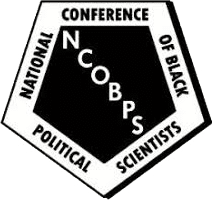It pains me to memorialize my friend, our brother, Dr. David Covin. He died at home in Sacramento, California, Saturday, June 3, 2023. David was with his immediate family: his wife Judy and daughter Holly.
It is hard to find the words to communicate what NCOBPS meant to David. He told me many times, in the long and endearing professional and personal relationship we enjoyed, that NCOBPS incorporated everything important to his being. Its annual meeting, he said, was the one professional thing above all others to which he looked forward. It was the people, he said; the quality of mind reflected in the brothers and sisters who showed up that lifted him in that special manner of family. In my observation, NCOBPS—its demands, quirks, hopes and aspirations—brought out utter bliss in his smile, always a bit sly, as he cocked that head of white hair! He was in his element being with us, and believing in us, as we all exercised our wont to resistance for the liberation of Black people. We are so much better that this brother passed through our professional and personal lives.
David Covin was a political scientist who specialized in comparative government. But he was first and foremost an activist, who professionally pursued political science. He was brought up in Evanston, Illinois and received an undergraduate degree at the University of Illinois-Champaign. From there he entered graduate school at the University of Colorado (MA), and completed his PhD at Washington State University. His interests initially focused on Asian politics, and he soon developed a major focus on politics among African descendants in the Americas. All of that, however, was put in the service of the social movement activism he honed during college and graduate work. It began with his work in the Civil Rights Movement in my home state of Mississippi, followed by student leadership of the Black Studies Movement in Washington State University. That focus and leadership continued in Northern California, where he made his professional career at Sacramento State University. He served as Professor of Government and Head of Pan African Studies. Foremost, however, it is where the vast scope and copious scale of his markings to enhance the lives of Black people are everywhere. Both town and gown in Sacramento and thereabouts have duly noted his reputation.
The Covin reputation was no less vast in NCOBPS, where he was literally everywhere. He joined the organization early in his career and has occupied veritably every post it offered in advancing the mission of liberating Black people. He gave papers on his research; organized panels; served on Council; and, generated grants and awards. He led NCOBPS as President (2003-2005), and co-edited its journal, The National Political Science Review. He mentored young scholars; routinely provided financial gifts; and worked to expand the Pan-Africanist goals of the organization throughout the Americas. In this latter role he co-led the development of a major transnational research/activist group: The Race and Democracy Project. This effort generated funding (1999 forward) from the National Science Foundation, the Ford Foundation, and the APSA. It brought together NCOBPS members with scholars and activists, first principally from Brazil, but later from all over South America and the Caribbean. In its accomplishments it was the partial realization of an NCOBPS dream to unite African descendants across the Americas to process, learn and resist the forces of oppression. The reality of the project obliterated the so-called barriers of language and supposed divisions wrought by differential cross-national state policies. Perhaps the greatest Covin marking from this work is now a standing organized section in NCOBPS on African descendants in South/Central America. It features a blossoming array of junior professors and PhD candidates researching and writing in these areas.
The archive of David’s professional products is vast, and divided into two genres: academic political science and literary works. Though to some they may seem unrelated, in David’s imagination they all formed a whole. Indeed, my introduction to his writing was his first novel, Brown Sky. It was a war story about Black soldiers, “the Third Platoon [that] subverts segregation, disrupts army maneuvers, and faces down southern lawmen and hostile civilians.” His last of many literary works is Raisins in Milk, an equally rhapsodic novel about the coming of age of a Black couple, traversing the routine horrors of racism from rural Florida to urban Massachusetts. Meanwhile, his two seminal political science monographs are: The Unified Black Movement in Brazil-1978-2002; and, Black Politics After the Civil Rights Movement…Sacramento, 1970-2000.Readers of both the genres in which he wrote will readily see their resonance to each other. They capture the unending commitment of David to the liberation of Black People.
We will all miss his physical presence as NCOBPS continues its journey toward liberation for Black people. Let us now rise to accept and build on the extraordinary legacy he leaves us.
A memorial will be scheduled for David in Sacramento in the Fall, 2023. Details will be communicated when they are complete. Cards of condolences may be sent as follows (the family requests no calls at this time):
Mrs. Judy B. Covin
4131 44th Street
Sacramento, CA 95820-2801
— — —
Minion K. C. Morrison, PhD
University of Delaware (Professor Affiliate)
University of Missouri-Columbia (Professor Emeritus)
